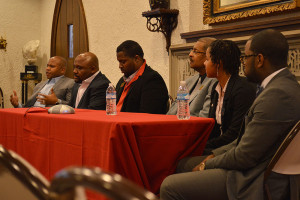Students, staff and faculty alike sat on the edge of their seats to listen to the stories of struggle and triumph offered to campus on Thursday with the first event – to prelude several others in the series – celebrating black history month, titled “Black Alumni and Life After Wittenberg: Opportunities and Challenge.”
 The kick-off event, sponsored by Multicultural Student Programs and Concerned Black Students, was held in Bayley Alumni House, whose location prompted much nostalgia for the group of alumni.
The kick-off event, sponsored by Multicultural Student Programs and Concerned Black Students, was held in Bayley Alumni House, whose location prompted much nostalgia for the group of alumni.
“We had our last moment at Wittenberg right here in this room. It’s truly a blessing to be here talking to the future,” said John Shumate, ’99, director of marketing at Pepsi Beverages Company, southeast region.
The panelists spoke about their Witt memories, various career treks and biggest failures. “You fail when you quit,” said Larry James, ‘78, vice president of equality and diversity at Mercy Health in Cincinatti. “Have I had adversity? Yes . . . but all those things have catapulted me forward.”
Shumate accredits his largest failure to his senior year at Wittenberg, when he passed up a particular hip-hop artist, booking rapper QuEST instead. “Two days after the performance, he [the other artist] released ‘Hard-knock Life,’” said Shumate, in reference to now best-selling music artist Jay-Z.
“Union Board changed my life. You have a lot of assets on campus you need to tap into,” Shumate said.
Derrick Braziel, ’09, co-founder of MORTAR Cincinnati, echoed similar sentiments, referencing his involvement with CBS and Athletes in Action. “If it weren’t for those experiences, I wouldn’t be sitting here today,” Braziel said.
Tosha Bell, ’07, a nuclear engineer at MELE Associates, reflected on another type of resource the university offers through its strong faculty presence on campus, sharing a story from her senior year when Daniel Fleisch, professor of physics, offered her his car, as she was experiencing vehicle trouble.
“What kind of professor offers students their cars? Wittenberg professors do that,” Bell said.
For Brian May, ’99, future Alumni Board President – as well as owner and founder of a digital marketing firm, Daymark Interactive – claims Wittenberg taught him about adaptation.
“When I think about Witt, this is the place you learn how to maneuver. There’s people from a small town who have never met black people – this is what the real world’s like . . . everybody’s different,” May said.
The panelist said that the valuable learning tools and experiences cultivated at the university should not be taken for granted. However, in reference to the common misconception that an alumni’s relationship with the university ends after graduation, Shakeer Abdullah, ’99, assistant vice-president of equality and diversity at the University of Minnesota, shared: “we have to invest in our institutions . . . for our degrees to mean something.”
Jordan Allen, ’16, felt the panel provided “inspiration, hope and influence for not only the African American community, but the entire Wittenberg family.”
University events celebrating black history month will continue throughout the month of February. Visit the Wittenberg website for more information about these upcoming events.







